Everything Begins and Ends at the Kentucky Club
 | |
| Author | Benjamin Alire Sáenz |
|---|---|
| Country | United States |
| Language | English |
| Genre | Short stories, Chicano literature |
| Published | Cinco Puntos Press |
| Pages | 222 |
| Awards |
PEN/Faulkner Award for Fiction (2013) Lambda Literary Award for Gay Fiction (2013) Stonewall Honor (2014) |
Everything Begins and Ends at the Kentucky Club is a collection of short stories by Benjamin Alire Sáenz, published in 2012 by Cinco Puntos Press.
The book compiles seven short stories, all set in the Hispanic/Latino community in El Paso, Texas in the United States and its neighbouring city of Juárez, Chihuahua in Mexico.[1]
The Kentucky Club, a real-life bar a few blocks south of the border crossing in Juárez, appears in all seven stories as a linking motif.[1][2] In addition, all seven stories touch in some way on themes of survival, of trying to live through pain, grief and loss and of the struggle to find and maintain love, both within the protagonists' birth families and in their sexual or romantic relationships.[2] Several also touch on the outbreak of violent crime that engulfed Juárez in the 1990s, and the ways in which that fractured the interrelated cross-border culture of the two cities.
Contents
| Story | Originally published in |
|---|---|
| "He Has Gone to Be with the Women" | Narrative |
| "The Art of Translation" | |
| "The Rule Maker" | |
| "Brother in Another Language" | |
| "Sometimes the Rain" | 11/11 |
| "Chasing the Dragon" | |
| "The Hurting Game" | |
Synopsis
"He Has Gone to Be with the Women"
Juan Carlos, a Chicano writer, and Javier, a Mexican consulate chauffeur, meet and start a relationship, frequently meeting at Juan Carlos' home in Sunset Heights. They talk about literature and their families often. Javier sometimes cuts theirs visits short as he has to spend time with his terminally ill uncle at the nearby hospital. After his uncle dies, the two men become closer.
After a few months, Juan Carlos asks Javier to move in with him, fearful Javier will become a victim of the violence in Juárez; Javier refuses. When Javier fails to show up for a date, Juan Carlos learns from friends that Javier has been kidnapped and has "disappeared." Juan Carlos spends months searching for any information but is ultimately unsuccessful.
One day, he receives a call from mutual friends Magda and Sofia regarding a watch of Javier that was found before his disappearance. They tell him to end his search as Javier has "gone to be with the women," a reference to Javier's mother who suffered a terrible fate in the desert. Juan Carlos soon leaves, ending up at the Kentucky Club.
"The Art of Translation"
In 1985, Nick Guerra is released from the hospital in El Paso after being treated for assault wounds and returns to living with his parents. The media tries to obtain his story but Nick is reclusive; he only goes out of the house for his job as a waiter and to run in the desert. He spends most of his time reading, relearning English and Spanish words, and translating those words between languages.
One day after work, he decides to go to a bar called the Regal Beagle; there, he meets Sylvia, a woman much older than him. They talk, and eventually they decide to go to the Kentucky Club before finally ending up at her apartment. Before they proceed to have sex, Nick tells her that he is open to anything except taking off this T-shirt. The morning after, she asks if he wants her phone number. He says yes, but ultimately refuses when she inquires about his back; he leaves her place on bad terms.
A week later, they run into each other again at the Regal Beagle and make up. They have sex again at her place but do not "make love." When she tries to remove his T-shirt, he steadfastly refuses. He leaves on worse terms than before. When he arrives home, he lays in bed thinking of English and Spanish words and phrase before falling asleep. When he awakes the next morning, he tries to come to terms with what happened when he was attacked: while the perpetrators were "writing" with a knife on his back, he should have "embraced it." He finally realize that he has to translate his deadpan life back into the world of the living.
Awards
The book won the PEN/Faulkner Award for Fiction in 2013,[3] making Sáenz the first Latino writer ever to win the award,[4] and also won a Lambda Literary Award in the Gay Fiction category at the 2013 Lambda Literary Awards.[5] It was also named at a 2014 Stonewall Honor Book by the American Library Association.[6]
References
- 1 2 "Vibrant 'Club' Links Two Countries In Award-Winning Book". NPR, April 30, 2013.
- 1 2 "‘Everything Begins and Ends at the Kentucky Club’ by Benjamin Alire Sáenz". Lambda Literary Foundation, May 31, 2013.
- ↑ "Book of short stories wins PEN/Faulkner prize". Associated Press, March 19, 2013.
- ↑ "El Paso author Benjamin Alire Sáenz wins PEN/Faulkner Award for Fiction" Archived 2013-04-09 at Archive.is. El Paso Times, March 19, 2013.
- ↑ "25th annual Lambda Literary Award winners announced". LGBT Weekly, June 4, 2013.
- ↑ "2014 Stonewall Book Awards Announced". American Library Association, January 28, 2014.